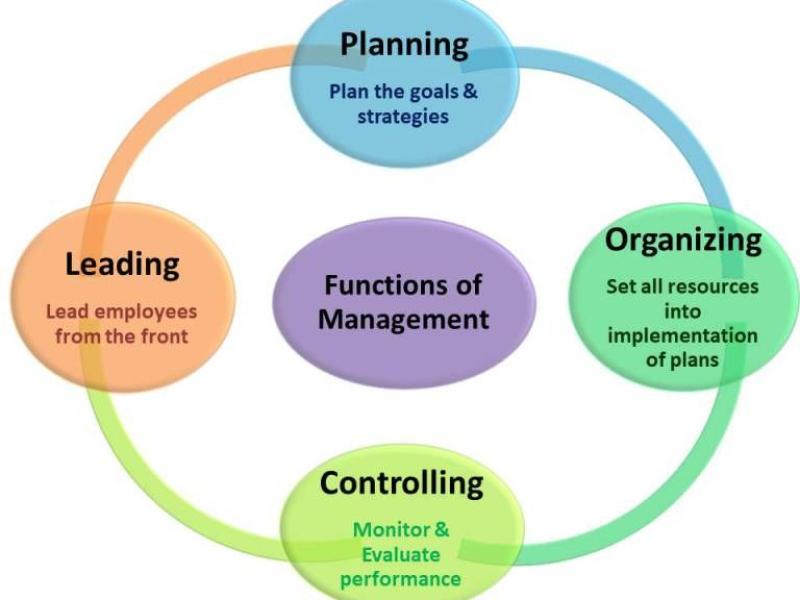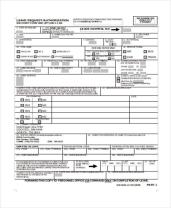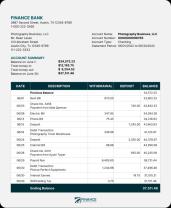What are the four primary functions of Management?
The four primary functions of management, often attributed to Henri Fayol, are:
Planning:
- Definition: Planning involves setting organizational goals and determining the best course of action to achieve those objectives. It is the process of deciding in advance what needs to be done, how it will be done, and who will do it.
- Key Activities: Establishing goals, developing strategies, creating plans, and making decisions.
- Importance: Planning provides a roadmap for the organization, ensures that resources are used efficiently, and serves as a foundation for the other management functions.
Organizing:
- Definition: Organizing is the process of arranging resources and tasks to achieve the objectives set during the planning phase. It involves creating a structure, defining roles and responsibilities, and allocating resources.
- Key Activities: Establishing the organizational structure, defining roles, allocating resources, and creating systems.
- Importance: Organizing ensures that the right people have the right resources and responsibilities to implement the plans effectively.
Leading (or Directing):
- Definition: Leading, also known as directing, involves influencing and motivating people to work towards the organization's goals. It includes activities such as decision-making, communication, and team management.
- Key Activities: Motivating employees, providing guidance, making decisions, resolving conflicts, and fostering a positive work environment.
- Importance: Leading ensures that individuals and teams are aligned with organizational objectives and are working productively to achieve them.
Controlling:
- Definition: Controlling is the process of monitoring and evaluating activities to ensure that they are consistent with the plans and objectives of the organization. It involves measuring performance, comparing it to standards, and making necessary adjustments.
- Key Activities: Monitoring performance, measuring results, comparing against standards, and taking corrective action.
- Importance: Controlling helps ensure that the organization is on track to achieve its goals, identifies deviations from the plan, and facilitates continuous improvement.
These four functions are often referred to as the "Four Functions of Management" and are considered foundational to the practice of management. While newer management theories and models may introduce additional functions or adapt these functions to contemporary contexts, the core principles of planning, organizing, leading, and controlling remain central to the discipline of management.
The Four Pillars of Effective Management: Planning, Organizing, Leading, and Controlling
Effective management is the cornerstone of organizational success. It encompasses a set of interrelated functions that guide and direct resources to achieve organizational goals. The four pillars of effective management are planning, organizing, leading, and controlling.
Planning: Planning establishes the direction and goals of the organization. It involves defining objectives, identifying strategies, and developing action plans. Effective planning provides a roadmap for the organization's future, ensuring that resources are allocated efficiently and efforts are aligned with strategic objectives.
Organizing: Organizing creates a structured framework for the organization's activities and resources. It involves defining roles and responsibilities, establishing departments and teams, and delegating authority. A well-organized structure ensures that tasks are coordinated, responsibilities are clear, and communication flows effectively.
Leading: Leading involves motivating, inspiring, and guiding employees to achieve organizational goals. Effective leaders foster a positive work environment, promote employee engagement, and align individual efforts with organizational objectives. They provide clear direction, offer feedback, and empower employees to make decisions and contribute to the organization's success.
Controlling: Controlling involves monitoring and evaluating organizational performance to ensure that it aligns with established goals and objectives. It involves setting performance standards, measuring actual performance, and taking corrective actions when necessary. Effective controlling helps organizations identify areas for improvement, make informed decisions, and ensure that they are on track to achieve their desired outcomes.
Understanding the Interplay of Management Functions in Achieving Organizational Goals
The four pillars of effective management are not isolated activities but rather interconnected processes that work together to achieve organizational success. Each function contributes to the overall effectiveness of the organization.
Planning provides the foundation for the other functions. It defines the direction and goals of the organization, providing a framework for organizing, leading, and controlling activities.
Organizing establishes the structure within which the other functions are carried out. It defines roles and responsibilities, ensuring that tasks are coordinated and resources are allocated efficiently.
Leading motivates and inspires employees to execute the planned activities. Effective leadership ensures that individual efforts are aligned with organizational goals and that employees are engaged and committed to achieving results.
Controlling monitors and evaluates the effectiveness of the other functions. It provides feedback to the planning, organizing, and leading functions, enabling continuous improvement and ensuring that the organization is on track to achieve its objectives.
Developing Managerial Skills for Effective Execution of Management Functions
Effective management requires a combination of hard and soft skills. Hard skills include technical expertise, knowledge of management principles and practices, and proficiency in tools and techniques. Soft skills include communication, leadership, problem-solving, and decision-making abilities.
Here are some key skills for effective execution of the four management functions:
Planning:
- Goal setting
- Strategic thinking
- Project management
- Decision-making
Organizing:
- Structure design
- Team building
- Delegation
- Resource allocation
Leading:
- Motivation
- Communication
- Conflict resolution
- Coaching and mentoring
Controlling:
- Performance measurement
- Data analysis
- Problem identification
- Corrective action
Continuous learning and development are essential for managers to enhance their skills and adapt to the ever-changing business environment. Effective managers seek feedback, attend training programs, and engage in mentorship to refine their skills and become more proficient in executing the four management functions.













